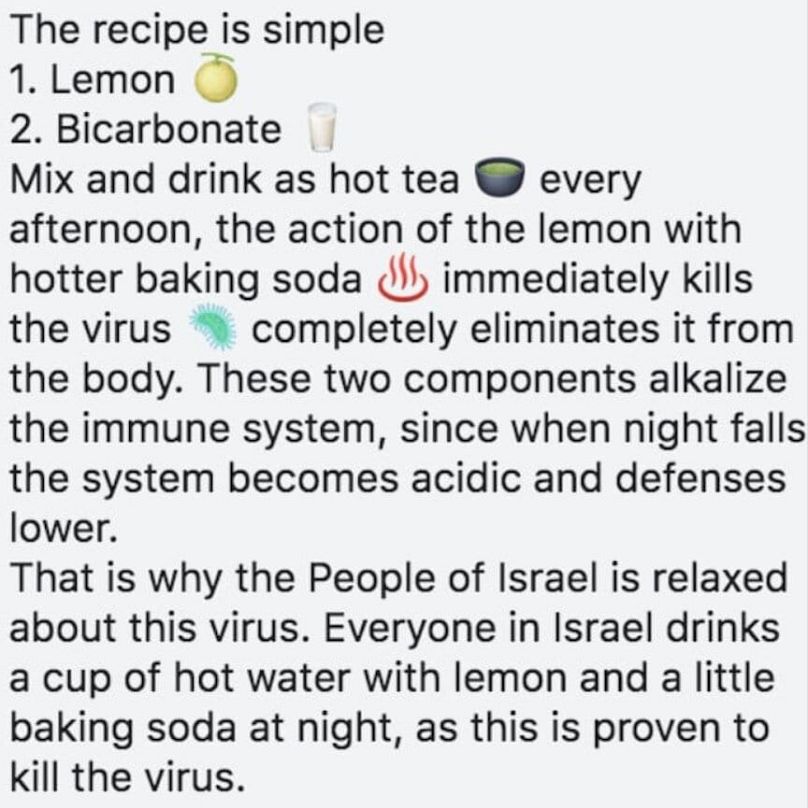A viral post has been circulating in numerous languages claiming that lemon, baking powder and hot water, can act as a 'cure' for COVID-19. We asked numerous virologists to explain why that's not true.
“We’re not just fighting an epidemic; we’re fighting an infodemic,” the director-general of the World Health Organization (WHO), Dr Tedros Adhanom Ghebreyesus, said in February. Since then, the coronavirus has evolved into a global pandemic, and the wave of disinformation has grown.
One such method of misinformation is the copy-and-paste of posts from anonymous or misidentified experts. An example of this is a false claim suggesting a 'cure' for SARS-COV-2 was found in Israel.
What is the claim?
The post, which we have found not only in English, but also in Spanish and Russian, begins by saying that there are "no cases" of coronavirus in Israel.
This in itself is untrue, with Israel reporting more than 5,000 confirmed cases of the virus as of 1 April.
It then suggests mixing lemon and baking soda with hot tea to "immediately kill" the virus, adding that this "alkalizes the immune system".
There are also numerous variations of this post. One such post found on Facebook calls on people to "have your daily dose of lemon water, or add baking powder instead" because the virus is "pH sensitive".
Why is this false?
We reached out to numerous virologists for their comment.
Professor Michael Kann, professor of clinical virology at the University of Gothenburg, Sweden, pointed to a study released earlier this year. Although not yet peer reviewed, the Chin. et al, study details how the SARS-COV-2 virus reacts under different conditions, from temperature to pH.
pH is a logarithmic scale, from 0 to 14, ranging from highly alkaline to acidic. Water is neutral and stands at 7. The scientists found that the virus has a high range of stability, from 3 to 10 on the pH scale.
So, if you added baking powder, which has a pH of approximately 9 and lemon juice with a pH of just under 3 to water, the pH would stand between 6 and 8, not near the levels that could destabilise the virus.
"The virus is stable to acid shown for a pH down to 3 (see also); pure lemon juice has a pH which is slightly lower. The idea that the addition of lemon juice to food or drinks is inactivating the virus is thus wrong," Prof Kann said.
Dr Gerald Keusch, professor of medicine and international health at Boston University School of Medicine, notes that it is possible that heat and acid pH can reduce the titre, or dilution, of the virus sample, saying that "there are some data emerging about this".
However, "this relates to decontaminating things like protective equipment, laboratory equipment", adding that "since the route of infection includes the nose and eyes, it's not going to be very safe to sanitise" these areas without causing "serious damage".
What about pure lemon
The original claim says that lemon, can "alkalize the immune system". So, can ingesting something acidic, like lemon which is below 3 on the pH scale, alter the pH of the body?
No, and this is due to a number of reasons.
"The body regulates the pH in a very narrow range, which is important for cell functioning (pH 7.37-7.43)," Prof. Kann told Euronews.
"When you drink lemon juice with a pH of 2.5 it arrives in the stomach in which you have a pH between 1.5 and 3.5," and thus the lemon juice does not alter the already acidic stomach. In addition, the a so-called proton-pump in the stomach maintains it's pH."
Even if there was a way to change the pH of the blood, the body would instantly try to readjust. There are more "complex regulation" processes, according to Prof. Kann, but one such method is the altering of breathing. With lower rates of breathing, the body accumulates CO2 leading to acidification and with higher rates, it reduces CO2 and increases pH levels. When the pH level of the blood is out of its normal range, you are extremely ill.
There are a number of institutions which have already debunked similar claims to the one outlined above. Johns Hopkins University warns against "swallowing or gargling with bleach, taking acetic acid or steroids, or using essential oils, salt water, ethanol or other substances," adding that "none of these recommendations protects you from getting COVID-19, and some of these practices may be dangerous".
According to WHO, "to date, there is no specific medicine recommended to prevent or treat the new coronavirus".












